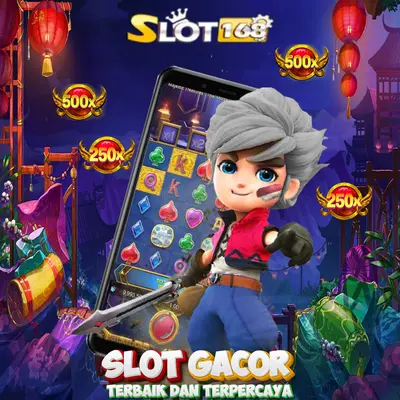
Slot168 Agen Betting Slot 168 Online Super Gacor JP Maxwin

Agen betting slot168 menyediakan berbagai macam permainan mesin slot 168 online dengan kualitas super gacor yang buat anda menang jp maxwin dengan gampang. Supaya anda bisa segera mencoba sensasi seru dalam meraih hadiah jackpot super megawin yang sensasional. Anda bisa langsung join bersama kami melalui link daftar slot168 yang sudah kami sediakan.
Untuk proses pendaftaran akun slot 168 paling gacor yang sedang viral saat ini. Anda cukup mengisi formulir pendaftaran yang sudah kami sediakan pakai data - data yang benar dan lengkap. Jika proses pendaftaran sudah anda lakukan dengan benar, anda secara resmi sudah terdaftar bersama agen betting slot168 terpercaya nomor 1 di Indonesia.
Supaya anda dapat langsung bermain pada games slot online dengan kualitas super gacor yang paling hoki hari ini. Anda hanya perlu melakukan minimal deposit sebesar 5000 rupiah saja. Dengan begitu, semua penggemar slot 168 online sekarang punya kesempatan untuk dapat meraih jp maxwin menggunakan modal receh. Jadi, kami sarankan anda untuk tidak menunggu terlalu lama lagi. Ayo segera daftar dan jadilah player slot online paling hoki yang berhasil meraih jp maxwin bersama login slot168 terbaik tanah air.
Alasan Memilih Agen Betting Slot168 Terbaik Indonesia
Sebagai penggemar games online mesin slot gacor yang sekarang ini sangat populer di seluruh penjuru nusantara. Tentu anda ingin mengetahui alasan mengapa anda harus memilih agen betting slot168 sebagai tempat bermain slot online. Untuk itu, kami akan memberikan sedikit informasi penting yang pasti akan membuat anda senang.
Melalui agen betting slot168 yang sudah memiliki reputasi sebagai salah satu situs slot gacor terbaik indonesia. Anda akan lebih gampang untuk menemukan permainan mesin slot 168 dengan rtp live terbaru yang memiliki win rate super tinggi. Hal tersebut menjadi sebuah berkah tersendiri untuk para pemain slot online yang ada di tanah air. Karena semakin tinggi win rate dalam permainan mesin slot online paling gacor yang sedang viral di tanah air. Maka pemain akan lebih mudah untuk meraih scatter atau freespin. Dimana hal tersebut akan membuat anda selangkah lebih dekat dengan hadiah JP maxwin yang tersedia pada login slot168 nomor 1 Indonesia.
Selain itu, agen bettingan slot 168 juga menawarkan hadiah jackpot maxwin dalam jumlah besar yang bisa anda menangkan dengan minimal deposit yang sangat murah. Kesempatan ini, tentu cuma dapat anda nikmati pada saat bermain slot online paling gacor melalui situs resmi slot168 terpercaya tanah air. Oleh karena itu, tidak salah kalau sampai hari ini games online slot 168 paling gacor masih jadi pilihan utama sloter di tanah air.
Share

